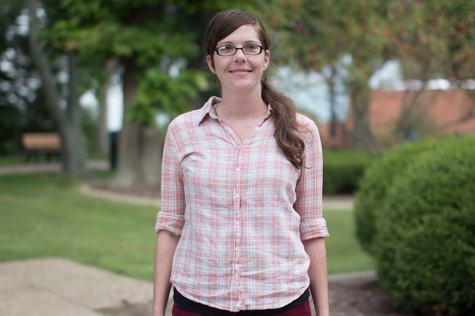The IU Southeast faculty senate will meet on April 25 to propose a plan to change the general education requirements for all degrees from 36 to 38, depending on the degree, credit hours down to 30.
The change must be implemented by May 15, 2013 to comply with Indiana SB182, the Higher Education Credit Transfer.
It will require all Indiana state colleges and universities to use a common core, which will make it easier for a student to transfer from one institution to another.
“We are going down from something that was never really clear— between 36 and 38— to something that is fixed at 30,” Victor Waingeh, assistant professor of chemistry and chair of the General Education Committee, said.
He said that even though the specific class requirements may differ, a student may transfer the general education core to another school as a block.
“Once it’s stamped on the transcript that they have completed gen ed., they have completed gen ed.,” Waingeh said.
According to the Indiana Statewide Transfer General Education Core, the first 18 credit hours will be the same at every school; the next 12 will be up to each individual institution to distribute according to that school’s value system.
Although this core only requires one writing course, Waingeh said the General Education Committee has included two in the plan that the faculty senate will vote on.
“We are still proposing to maintain our six credit hours because we believe that writing is a key component of education,” he said.
Some of the other proposed changes include cutting the science requirement down to one lecture with a corresponding lab.
Another competency that is not mandated by the state but will remain a requirement for IU Southeast is diversity and ethical reasoning.
Under the new plan, students will have the option to take one course or the other, since the two often overlap, Waingeh said.
“When you take a diversity class, you are going to somehow learn a lot about ethics,” he said. “And when you take an ethics class, you are going to somehow learn a lot about diversity.”
David Phaire, informatics and computer science junior, said he considers himself a lifelong learner.
Although he transferred into IU Southeast with an associate’s degree from Jefferson Community and Technical College, he still had to take a diversity course.
He said he believes this, and other requirements such as information literacy, are important in education.
“With the changing times and technology and the way the economy is, not only here in the US but globally, you need to have a broader background of different things,” Phaire said.
Although Phaire has completed his general education requirements, he said he thinks new students coming in may be negatively affected by the re-distributed credit hours.
“I think they will be missing out in some instances,” he said. “I think that the more that you know, the more rounded that you are, the stronger it makes the university.”
Waingeh said that the minimum of 120 credit hours required for graduation will remain the same.
The extra hours that have been included in the general education package will be re-distributed within specific degrees.
“Because we are going from 38 or so down to 30, programs may have additional wiggle room within the 120 credit hours to add what they would like,” he said.
“For example,” Waingeh said, “If your program required two science classes and you were getting those two science classes through gen ed., and gen ed. now requires only one, you may have to include a science course as part of your major as an elective.”
Under the current requirements at IU Southeast, eight student-learning outcomes must be met to be complete the general education requirements. Since some classes may meet more than one criterion, it has been possible for one class to count for six hours. Under the new legislation, this “double-dipping” will not be possible, Waingeh said.
“If we assign three credit hours to critical thinking and three credit hours to central ideas, you cannot count one course for six credit hours,” he said. “Each competency area has a specific credit hour value attached to it.”
It will still be possible, however, to use a course that is part of the general education requirements as a program requirement.
“You cannot take C106 without taking C105,” Waingeh said. “So C105 is a requirement for a chemistry major. If you have taken C105 as a gen ed. requirement, you don’t have to take it again as a chemistry major because the three credits will already count among the 30.”
Waingeh said the new general education requirement changes will be finalized at the April meeting and go into effect immediately.
“Any changes will not necessarily affect current students but if they see an advantage in the new requirements, they can opt into that,” he said. “We are trying to meet the state mandate but still keep our own IU Southeast ideas. “








